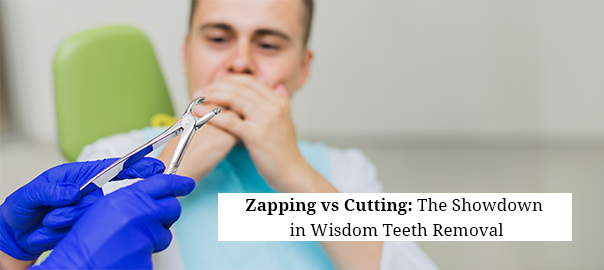
Zapping vs. Cutting: The Showdown in Wisdom Teeth Removal
Table of Content
Wisdom Teeth Removal Techniques
When it comes to bidding farewell to those troublesome wisdom teeth, modern dentistry offers two primary approaches: traditional extraction and laser removal. Let’s explore the key differences between these techniques to help you understand your options.
Traditional Extraction
1. Simple Extraction:
Used for fully erupted, accessible wisdom teeth
Employs conventional dental tools
Generally quicker for straightforward cases
2. Surgical Extraction:
Necessary for partially or fully impacted teeth
Involves incisions in the gum and possibly bone removal
Often requires stronger anesthesia
Pros of Traditional Methods:
Well-established, time-tested techniques
Suitable for a wide range of cases
Generally more cost-effective
Cons of Traditional Methods:
Can cause more post-operative pain and swelling
Longer recovery time
Higher risk of dry socket
Laser Removal
Uses high-energy light beam to damage the tooth
Less invasive than traditional surgery
Often results in faster healing
Advantages of Laser Removal:
Typically less painful during and after the procedure
Reduced swelling and bleeding
Faster recovery time
Improved blood flow to the surgical site
Potential Drawbacks:
Not suitable for all cases of impaction
Higher cost due to specialized equipment
Slightly higher risk of incomplete removal
Factors to Consider:
Tooth Position: The degree of impaction influences technique selection
Overall Oral Health: Existing conditions may impact the choice
Patient Preferences: Comfort levels with different procedures vary
Cost Considerations: Laser treatments often come with a higher price tag
Summary:
Both traditional and laser techniques have their own significance in wisdom teeth removal. Laser technology comes packed with exciting benefits of patient comfort & speedy recovery. But its application universally is difficult. Your dentist will assess your case and recommend the most appropriate method as per your needs.
Remember, regardless of the technique chosen, proper aftercare is crucial for a smooth recovery. Always follow your dentist’s post-operative instructions carefully to ensure the best possible outcome.
Leave a Reply
Leave a Reply
Explore More Similar Posts
Explore More Blogs


Leave a Reply